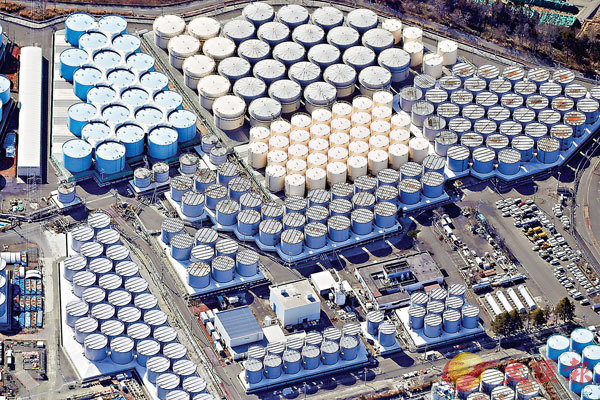 ● 日本福島第一核電站核污水儲水罐。 資料圖片
● 日本福島第一核電站核污水儲水罐。 資料圖片【原文】日本政府4月13日單方面決定,將福島核廢水直排太平洋,引發全球質疑和反對。日本罔顧國際公共健康安全和周邊國家人民利益,一意孤行要將核廢水直排大海,自私不負責、害人害己。香港是日本農林水產品最大出口目的地,日本此舉直接危害香港市民健康和商界利益。特區政府需高度關注事態發展,嚴檢日本抵港食品,必要時果斷禁止日本受影響食品進口,勿讓核廢水禍港。
福島核災難造成大量核廢水,至今已10年,日本未能妥善解決問題,反而決定以「成本最低、最易操作」的方式,將核廢水直接排放太平洋。核廢水危害人類及環境健康不容置疑,並非日方聲稱經過濾和稀釋後可保安全。
德國海洋科學研究機構指出,核廢水排放5天後在日本海域擴散、57天後擴散至大半個太平洋、224天後擴散至中國台灣及韓國濟州島、406天後至中國東部沿海、10年後遍布整個海洋。綠色和平組織核專家指出,日核廢水所含碳14在數千年內都存在危險,並可能造成基因損害。日本不尊重科學、只顧自身方便,決定將核廢水直排入海,引發包括全球數十國家和地區的憤怒和反對,日本環團亦直指日本政府不是不可為、而是不想為。
科學研究顯示,核廢水入海,海產最高危,尤其是在太平洋的海產。香港向來是日本農林水產品最大出口目的地。據日本政府數據,2020年日本出口至香港的農林水產品高達155億港元,佔日本總出口金額的22.3%,福島縣上月曾到港推廣其大米、果汁等農產品。核廢水直排大海,將影響香港市民健康,同時直接打擊本港消費者對日本食材信心,損害商戶利益,香港工聯會、「香港地球之友」等多個團體對日本核廢水直排入海表示關切擔憂。
特區政府要積極回應社會關切,一方面香港食安中心要檢討福島產品檢測政策、查遺補漏,並加強對日本出口至港的產品檢測,必要時收緊對日本受影響產品的進口;另一方面負責監測香港環境輻射水平的天文台等,要加強監測本港水域,透明公布結果,各方共同協作,將日本不負責任直排核廢水對本港的影響減至最低。 ( 摘錄自香港《文匯報》社評 2021-4-14)
Tighten import control on Japanese food to keep Hong Kong clear of radioactive contaminants
【譯文】Japan's unilateral decision on 13 April to release nuclear-contaminated wastewater from Fukushima into the Pacific Ocean has drawn doubts and opposition from the international community. This self-centered and irresponsible decision not only inflicts harm on Japan and everyone else, but it also shows Japan's complete disregard for both the interests of its neighbours and international public health safety.
As Hong Kong is the biggest importer of Japanese agricultural and fishery products, Japan's move has directly endangered the health of Hong Kong citizens and the interests of Hong Kong businesses. To keep Hong Kong clear of radioactive contaminants, the government must monitor the situation closely, tighten import controls on Japanese food, and ban the import of affected Japanese products altogether when necessary.
For the last ten years, the Fukushima nuclear disaster has been creating large amounts of radioactive wastewater. Having failed to solve the problem properly, Japan now opts for the cheap and easy way of dumping the nuclear wastewater directly into the Pacific Ocean. Contrary to the Japanese claim that it is safe after being filtered and diluted, there is no doubt that the wastewater poses a great threat to both the environment and human health.
According to a German research institute for marine science, the Fukushima nuclear wastewater will spread along the Japanese coast within 5 days. It will then spread to most of the Pacific Ocean within 57 days, Taiwan and Jeju after 224 days, the coast of Eastern China after 406 days, and finally reach all oceans of the globe in a decade. Green Peace nuclear experts also pointed out that carbon-14, a radioactive material that is found in the nuclear wastewater, will remain hazardous for thousands of years and might damage human DNA.
Japan has shown that it has no respect for science by choosing the easy way of dumping the nuclear wastewater into the ocean, and such actions have sparked global outrage and opposition. Environmental organisations in Japan have also pointed out the fact that, the Japanese government is merely avoiding the hard but correct path instead of truly running out of options.
Scientific research indicates that seafood, especially those that are caught in the Pacific Ocean, is the most prone to contamination from the radioactive wastewater. And Hong Kong has always been the biggest importer of Japanese agricultural and fishery products.
According to official Japanese data, 22.3 per cent of agricultural and fishery product exports in 2020 were sold to Hong Kong, with sales figures amounting to a staggering HK$15.5bn. Produce from the Fukushima Prefecture, such as rice and fruit juices, were also being promoted in Hong Kong last month.
Dumping nuclear wastewater into the ocean will not only affect Hong Kong citizens' health, but also harm the interests of businesses, as it will deal a serious blow to consumers' confidence in imported Japanese food. Multiple local organisations, such as the Hong Kong Federation of Trade Unions and Friends of the Earth HK, have already expressed concerns over Japan's decision.
The SAR government should proactively respond to the public's concerns. On the one hand, the Centre for Food Safety should review its import control regime for Fukushima food products and seek to seal possible loopholes.
Testing on imported Japanese products should also be strengthened, and the importation of such products should be tightened when necessary. On the other hand, bodies that are responsible for monitoring environmental radioactivity, such as the Hong Kong Observatory, should step up the surveillance on Hong Kong waters and maintain data transparency. All parties must work together so as to minimise the impact of Japan's irresponsible actions on Hong Kong.●Jeffrey Tse
Exercise
1. 核反應堆
2. 爐心熔解/核熔燬
3. 放射性污染
4. 半衰期
5. 核燃料棒
Answer
1. nuclear reactor
2. nuclear meltdown
3. radioactive contamination
4. half-life
5. fuel rod

